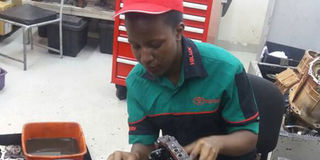Braving hurdles in male-dominated job

Pamela Otuhokwesiga, an automotive engineer says most customers prefer having her male counterparts repair their cars to her. Photo by Dorcus Murungi
What you need to know:
- In a world where customers prefer men to women in repairing their cars, and employers call out for male mechanical engineers, Pamela Otuhokwesiga, an automotive engineer, is proof that what a man can do, a woman can do better.
Pamela Otuhokwesiga is a mechanical engineer working with Toyota Uganda. The 27-year-old mechanic says she keeps receiving phone calls from clients asking her about the progress of their car repairs. It is amazing how she interacts with them; one would imagine she has been in the field for more than 20 years.
Otuhokwesiga says her passion at being an engineer started as a child. “While I was growing up, I was very curious; I always wanted to know how things are done and this urge is what shaped my passion. In my O-Level I developed love for science subjects and I scored distinctions in all of them in my UCE results,” she says.
She says she excelled in Physics, Chemistry, Biology and Mathematics (PCB/M) while at Mary hill High School in Mbarara which enabled her to take on an engineering course at Kyambogo University.
“I decided to go in for Bachelors in Automotive and Power Engineering at Kyambogo University and it was relatively still a new course. I was also reliably informed that only one woman had taken on the course by that time but that did not scare me away. I was determined and convinced that what a man can do, a woman can do better,” she says.
Otuhokwesiga says while at university, the class was predominantly male, but this she says encouraged her to work harder and prove everybody wrong especially those who thought some courses are only for men. She notes that some boys were bullies but that did not stop her from pursuing her goal.
“I forged a way of co-existing with them because that was the only way I was going to achieve my goals. I made them my friends and team work helped me to manage complex situations. Boys are good team players and they are always ready to assist,” she explains.
Tough venture
In 2011, Otuhokwesiga started her practice from the mechanical workshop at university. She says the workshop had all the machines such as grinders, lathe machines, and welding machines, among others.
“I started learning some simple basics and most importantly I also learnt working ethics such as honesty, accuracy, and right deductions after thorough investigations. These have been helpful in executing my work,” she says.
Tough world
In 2012 she says she went to a local garage in Nakawa where she got exposed to the real world of mechanics. While here, she could repair the cars while lying on the floor sometimes. She admits that the experience was challenging but it taught her much about what it requires to work for the local market.
In 2013, she joined Century Bottling Company in Namanve and this is when she started repairing heavy trucks. To her, this was an exciting experiment because she was working in a standard workshop that had all the tools.
In 2014, she joined Toyota Uganda as an apprentice and after a two-year training in the workshop, she is now a service advisor. She says she now advises clients on car servicing, repairs and major diagnosis on electrical problems.
“You cannot be a service advisor if you do not know how to repair a car, that is why it is advisable for a person pursuing a mechanical engineering course to start practice while still at university,” she notes.
To Otuhokwesiga, though the community still presumes that mechanical engineering is predominantly a male course, it is a course that girls can also do.
“Girls usually pay more attention to detail and their concentration can be key towards passing,” she says.
Skills matter most
She says though people think that mechanical engineering is all about using much energy, the skills matter most in this course.
“It is not all about energy in this course but the skills. There are machines and tools such as the hydrolic choist, hydrolic jack, and hydrolic tools, this equipment repairs a car without using much energy,” she observes.
However, Otuhokwesiga says, though some girls are coming up to take up the course they are being sidelined by most employers.
“You find an advert for a mechanical engineer specifically requiring a man. Some customers undermine women. They believe they cannot fix the cars well. Generally the whole profession is still being considered a male thing which is unfair,” she observes.
She calls upon companies and hiring agencies to stop segregating women because to her girls have the potential to even do better than men.



